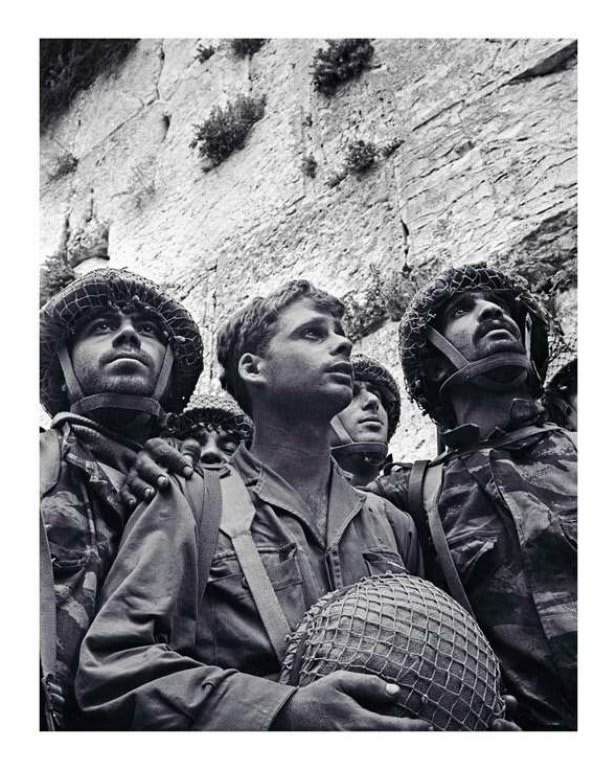Let’s Open Our Sefarim This Yom Yerushalayim
On May 16 and 17, 2017, Shlomo Horwitz of Jewish Crossroads conducted interviews with two heroic paratroopers involved in liberating the Kotel on Yom Yerushalayim. These modest and gentle men, now in their 70s, share their valuable insights. Translated from the original Hebrew by Shlomo Horwitz.
Remarks from Moshe Milo, Radioman of Paratroop Brigade 55, Battalion 71, Company A, in response to Shlomo Horwitz’s question about how the liberation of the Kotel affected the paratroopers from a religious standpoint:
“To the best of my knowledge, the foundational event of the liberation of the Kotel emotionally affected the brothers-in-arms of my company. I can give you one example, about a soldier named Ze’ev Parnes from my company, an immigrant from the Soviet Union, and a self-declared secular Israeli. He recounted that he stood facing the Kotel, and that the stones of the Kotel did not “speak” to him.
But when he saw the two rabbis, Harav Zvi Yehuda Kook, and the Nazirite, Rabbi David HaKohen, ZTL reaching the Kotel, and particularly the Nazirite, stretch himself facedown on the ground and crawl to the Kotel, he became deeply moved. Today Ze’ev visits the synagogue every Friday and Shabbat. That’s one specific case.
There were absolutely secular soldiers standing there, and they were swept away with the enthusiasm of the religious soldiers. It was impossible to remain indifferent. The excitement touched everyone.
There were cases of people becoming religious, but those were in the minority.”
___________________________________________________________________
Remarks from Avraham Schechter, ‘runner’* and combat assistant to the Company Commander, Captain Yoram Zamosh, Paratroop Brigade 55, Battalion 71, Company A, in response to Shlomo Horwitz’s question about what he was thinking when he was one of the first to pray at the Kotel on June 7, 1967:
“I grew up in a Jewish, Zionist and religious home, and was a member of the B’nai Akiva youth group. The way we were educated regarding the whole subject of the Shoah, the basic idea was the concept of “V’techezena einenu b’shuvcha leZion” (may our eyes see when You return to Zion). (This always meant a focus on) Eretz Yisrael, Yerushalayim.
In our home I always heard stories from my father, z’l about how, before ‘48, he used to go for the three major holidays to Yerushalayim, and he’d go to the Kotel with my older brother (who is now 83 years old). This made me jealous, since they had been there, but I had not, since I was born in ’47, a year before the outbreak of battles in the War of Liberation and the departure of the Jews from the Old City.
“But in light of my education, the yearning and the extended service in the Paratroops, it brings you to tremendous feeling (to liberate the Kotel). First of all, one can say that this is revenge against the Greeks and the Romans. A Jewish soldier, Jewish soldiers, paratroopers, restoring what belongs to the Jewish People. And to come back after 19 years under foreign control, when they didn’t allow any Jew to go there. The chance to pray, to blow the shofar, or do anything else that was not possible to do for decades before the Six Day War.
I was moved, yes. They say I cried. Among my thoughts was how much I wanted my father to know at that moment where I was, since I knew how important it was to him. When I was a child and we used to hike in Jerusalem and we’d go up to David’s Tower, to Mount Zion, we would gaze at where we estimated the Kotel to be, with the hope of getting there one day.
It’s a great merit to be one of the people who have liberated and restored the Kotel to the Jewish People. It’s not a simple matter. There is crying, excitement. One of the prayers (I had), as I can remember, was a request that we will never need to give back this place again, that it would stay with us forever.
It’s very hard to convey feelings like this in a telephone conversation, if at all.
I know that you, like me, as a believing Jew who observes the Mitzvot, know that Jerusalem is the Eternal Capital. It was the capital of the Jewish People, and it will remain the capital of the Jewish People. And all those around us can say what they want!
…we have no other solution (other than) to just make aliyah. The more people come on aliyah, the stronger we will be.”
*Mr. Schechter explained that the ‘runner’ (Ratz Mem-Pay) acts as the personal bodyguard to the Company Commander, and serves as a conduit for information by acting as the Commander’s personal messenger in between squad to squad, company to company, etc.
See also: A Paratrooper in Jerusalem
The words of this author reflect his/her own opinions and do not necessarily represent the official position of the Orthodox Union.

